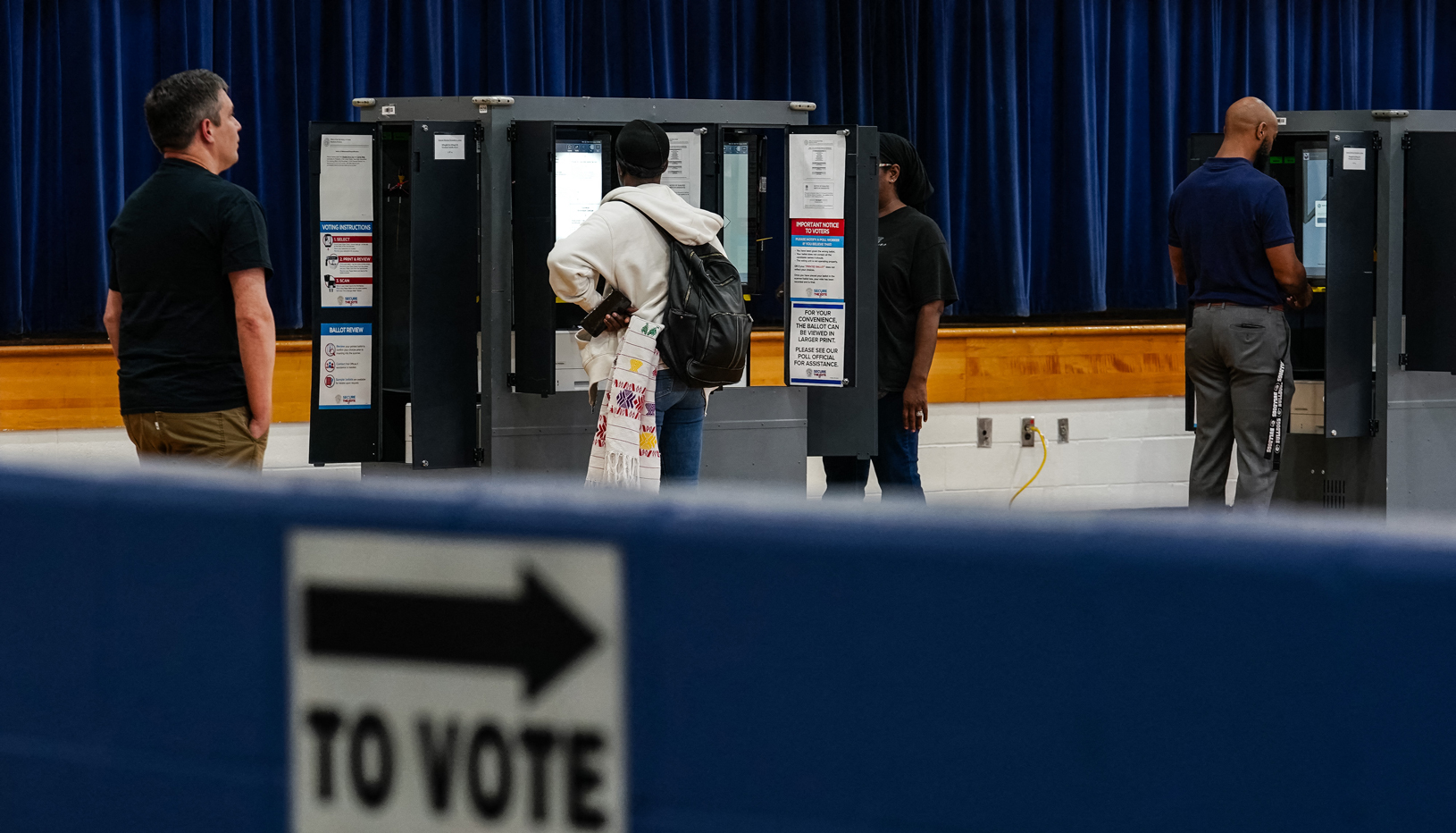Despite the president’s recent call for volunteers to “watch closely” at the polls, individuals cannot just show up and wreak havoc in polling places.
Of course, federal law prohibits discrimination and intimidation at the polls. 1 Voter intimidation of any kind is a crime, and prohibitions on intimidation apply equally to poll watchers and challengers.
But even beyond these baseline rules, nearly every state has laws designed to curb aggressive behavior by poll watchers and challengers, including limits on how many watchers or challengers are permitted, who can serve in these roles, processes for appointment, and restrictions on conduct.
Not everyone can simply show up to be a poll watcher; becoming a poll watcher is an involved process in most battleground states.
- In nearly every battleground state — Arizona, Florida, Georgia, Iowa, New Mexico, North Carolina, Ohio, Pennsylvania, and Texas — poll watchers must be appointed in advance of the election by party or candidate representatives. 2
- All nine of these battleground states affirmatively require watchers to provide some form of written confirmation of their appointment to officials, either prior to the voting period or when they arrive at voting locations. 3
Many states limit how many watchers can be at the polls and what they can do.
- Most battleground states — Florida, Georgia, Iowa, North Carolina, Ohio, Pennsylvania, and Texas — limit in advance the number of individuals who can serve as watchers in each polling place. 4
- While poll watchers need not be designated in advance in Michigan, Nevada, and Wisconsin,5 these three states impose other restrictions so that watchers
do not get out of hand. For example:
- Wisconsin gives local election officials the power to limit the number of poll watchers and to restrict watchers’ locations. 6
- Nevada requires watchers to sign acknowledgements that they are prohibited from talking with voters and interfering with voting, and they are expressly subject to removal from the polling place if they engage in any of the prohibited conduct. 7
- Michigan provides standards of conduct for watchers, the violation of which will result in removal from the polling place. 8
States limit who can challenge a voter’s eligibility, and how.
- Nearly half of all states either do not authorize members of the general public to serve as challengers at the polls (e.g., Ohio 9 and Texas 10) or restrict the number of people who can serve as challengers inside the voting space — including battlegrounds like Arizona,11 Michigan,12 Montana,13 and New Mexico.14
- In states like Florida, Nevada, and North Carolina, only electors from the specific precinct or county may mount a challenge, limiting the risk of disruption from outsiders. 15
- In Michigan, challengers must be specifically appointed and carry credentials verifying their appointment. 16
- Ohio, Florida, and New Mexico explicitly bar law enforcement officers from serving as challengers (or poll watchers, for that matter). 17
States strictly regulate the conduct of challengers at the polls.
- Key battlegrounds like Pennsylvania, Florida, and Georgia (among other states) require challenges to be made by a written sworn oath. 18
- North Carolina and Montana require specific documentary evidence to sustain a challenge. 19
- Several states strictly limit the grounds on which a challenger can lodge a challenge against the voter. 20
- Georgia, Kentucky, Michigan, Maryland, and Nevada expressly permit election officials to remove watchers or challengers who interfere with the voting process. 21
- Florida and Montana have rules to discourage spurious challenges, with Florida criminalizing “frivolous” challenges 22 and Montana giving election officials the power to reject challenges they deem insufficient before asking the challenged voter to respond. 23
With all of these regulations in place, and with local election administrators actively preparing and coordinating with state and federal officials to keep voters safe, voters should not let fearmongering from the president, or anyone else, discourage them from casting their ballots.
Endnotes
-
1
18 U.S.C. § 594. -
2
Ariz. Rev. Stat. § 16–590; Fla. Stat. § 101.131; Ga. Code § 21–2–408; Iowa Code § 49.104; Ia. Sec’y of State, Poll Watchers Guide (Jan. 2018), https://sos.iowa.gov/elections/pdf/pollwatcherguidebook.pdf; N.M. Stat. § 1–2–27(A); N.C. Gen. Stat. Ann. § 163–45; Ohio Rev. Code § 3505.21; 25 Pa. Cons. Stat. § 2687(a); Pa. Dep’t of State, Guidance on Rules in Effect at the Polling Place on Election Day at 1 (Oct. 2016), https://www.dos.pa.gov/VotingElections/OtherServicesEvents/Documents/DOS%20GUIDANCE%20ON%20RULES%20IN%20EFFECT%20AT%20THE%20POLLING%20PLACE%20ON%20ELECTION%20DAY%2010–16.pdf; Ohio Rev. Code § 3505.21(C); Tex. Elec. Code Ann. §§ 33.003–33.005. -
3
Ariz. Rev. Stat. § 16–590(A); Fla. Stat. § 101.131; Ga. Code § 21–2–408; Iowa Code § 49.104; N.M. Stat. § 1–2–29; N.C. Gen. Stat. § 163–45(b); Ohio Rev. Code § 3505–21; 25 Pa. Stat. § 2687; Tex. Elec. Code § 33.051(a). -
4
Fla. Stat. § 101.131; Ga. Code § 21–2–408; Iowa Code § 49.104; Ia. Sec’y of State, Poll Watchers Guide at 2 (Jan. 2018), https://sos.iowa.gov/elections/pdf/pollwatcherguidebook.pdf; N.C. Gen. Stat. § 163–45(a); Ohio Rev. Code § 3505.21(B); 25 P.S. § 2687(a); Pa. Dep’t of State, Guidance on Rules in Effect at the Polling Place on Election Day at 1 (Oct. 2016), https://www.dos.pa.gov/VotingElections/OtherServicesEvents/Documents/DOS%20GUIDANCE%20ON%20RULES%20IN%20EFFECT%20AT%20THE%20POLLING%20PLACE%20ON%20ELECTION%20DAY%2010–16.pdf; Tex. Elec. Code § 33.007. -
5
Wis. Stat. § 7.41(1); Mich. Dep’t of State Bureau of Elections, The Appointment, Rights and Duties of Election Challengers and Poll Watchers at 12 (Sept. 2020), https://www.michigan.gov/documents/SOS_ED_2_CHALLENGERS_77017_7.pdf; Nev. Rev. Stat. § 293.274(1). -
6
Wis. Stat. § 7.41(1)–(2). -
7
Nev. Admin. Code § 293.245. -
8
Mich. Dep’t of State Bureau of Elections, The Appointment, Rights and Duties of Election Challengers and Poll Watchers at 12 (Sept. 2020), https://www.michigan.gov/documents/SOS_ED_2_CHALLENGERS_77017_7.pdf. -
9
Ohio Rev. Code § 3505–20. -
10
Tex. Elec. Code Ann. § 33.001; Tex. Elec. Code § 16.091. -
11
Ariz. Rev. Stat. § 16–590. -
12
Mich. Comp. Laws § 168.730; Mich. Dep’t of State Bureau of Elections, The Appointment, Rights and Duties of Election Challengers and Poll Watchers at 6 (Sept. 2020), https://www.michigan.gov/documents/SOS_ED_2_CHALLENGERS_77017_7.pdf. -
13
Mont. Code § 13–13–120(1). -
14
N.M. Stat § 1–2–25 (A)(6), (B). -
15
Fla. Stat. §§ 101.111, 101.131; Nev. Rev. Stat. § 293.303; N.C. Gen. Stat. § 163–87. -
16
Mich. Comp. Laws § 168.730; Mich. Dep’t of State Bureau of Elections, The Appointment, Rights and Duties of Election Challengers and Poll Watchers at 4–5 (Sept. 2020), https://www.michigan.gov/documents/SOS_ED_2_CHALLENGERS_77017_7.pdf. -
17
Ohio Rev. Code § 3505.21(B); Fla. Stat. § 101.131(3); N.M. Stat. § 1–2–22(D). -
18
Colo. Rev. Stat. § 1–9–202; Fla. Stat. § 101.111; Ga. Code § 21–2–230; Ind. Code § 3–11–8–20; N.H. Rev. Stat. § 659:27; N.J. Stat. § 19:15–18.2; Or. Rev. Stat. § 254.415; 25 P.S. § 1329. -
19
Mont. Code § 13–13–301(1) & Mont. Admin. R. 44.3.2109(2); N.C. Gen. Stat. § 163–90.1(b). -
20
Ark. Code § 7–5–312; Haw. Rev. Stat. § 11–25; Md. Code, Elec. Law § 10–312(a)(1); 17 R.I. Gen. Laws § 17–19–27; Vt. Stat. tit. 17, § 2564. -
21
Ga. Code § 21–2–408(d); Ky. Rev. Stat. § 117.318(1); Mich. Comp. Laws § 168.730; Mich. Dep’t of State Bureau of Elections, The Appointment, Rights and Duties of Election Challengers and Poll Watchers at 5 (Sept. 2020), https://www.michigan.gov/documents/SOS_ED_2_CHALLENGERS_77017_7.pdf; Md. Code, Elec. Law § 10–311(d)(2); Nev. Admin. Code § 293.245. -
22
Fla. Stat. § 101.111(2). -
23
Mont. Code § 13–13–301(3).



